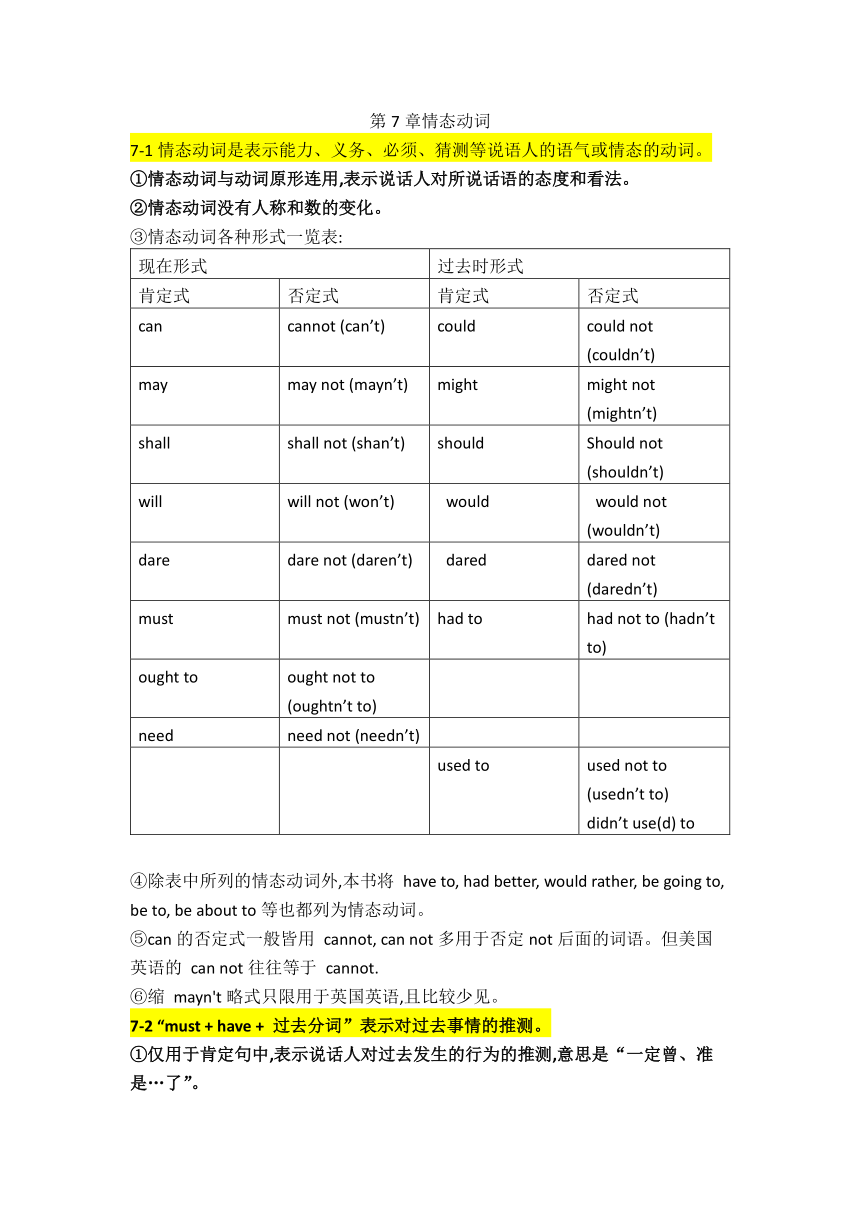
第7章情态动词 7-1情态动词是表示能力、义务、必须、猜测等说语人的语气或情态的动词。 ①情态动词与动词原形连用,表示说话人对所说话语的态度和看法。 ②情态动词没有人称和数的变化。 ③情态动词各种形式一览表: 现在形式 过去时形式 肯定式 否定式 肯定式 否定式 can cannot (can’t) could could not (couldn’t) may may not (mayn’t) might might not (mightn’t) shall shall not (shan’t) should Should not (shouldn’t) will will not (won’t) would would not (wouldn’t) dare dare not (daren’t) dared dared not (daredn’t) must must not (mustn’t) had to had not to (hadn’t to) ought to ought not to (oughtn’t to) need need not (needn’t) used to used not to (usedn’t to) didn’t use(d) to ④除表中所列的情态动词外,本书将 have to, had better, would rather, be going to, be to, be about to等也都列为情态动词。 ⑤can的否定式一般皆用 cannot, can not多用于否定not后面的词语。但美国英语的 can not往往等于 cannot. ⑥缩 mayn't略式只限用于英国英语,且比较少见。 7-2 “must + have + 过去分词”表示对过去事情的推测。 ①仅用于肯定句中,表示说话人对过去发生的行为的推测,意思是“一定曾、准是…了”。 [例] I didn' hear the phone. I_____asleep. A. must be B. must have been C. should D. should have been 答案是B。“我没有听见电话铃声,那时我一定是睡着了。”A意为 “现在我一定睡着了。”C意为“现在我应该睡着。”D意为“那时我本应该睡着了(其实却没睡着)。A、C、D都与句意不符。 ②本结构的否定形式不能用mustn't, 而要用can’t或 couldn't [参见7-3]。 ③本结构在变成反意疑问句时,其疑问尾句中不可使用must,而是要根据具体的时间概念,采用didn’t或 haven't to。 [例] He must have studied English last night, didn’t he “昨晚他一定学英语了,是吧 ” 因为有last night这个表示确定的过去时间状语,可知所述动作发生在过去,要用过去时。 [例] He must have studied English for years, hasn’t he “他一定学了多年英语了,是吧 ” 因为有 for years表示一段时间的状语,可知谓语动作在过去发生,并一直延续至今故用现在完成时。 7-3 can或 could + have + 过去分词”表示对过去某事的否定的或疑问的推测。 ①这种结构只能用在否定句和疑问句中。肯定句中常用“must”[参见7-2]。 [例] --There were already five people in the car but they managed to take me as well. --It _____a comfortable journey. A. can't be B. shouldn't be C. mustn't have been D. couldn't have been 答案是D。“一车里已有五人,但他们还是设法带我同行。” “那么,这趟旅行一定不会舒适了。”must不用于表否定推测,排除C。 而A和B都意指“现在”,与句意不符,故可排除。 ②这种结构中的can和 could都用来表示过去的可能性,“时间”上没有区别。但“语气”上有区别: could的“可能性”、把握性”要小于can若上例中的 空白改用“can’t have been,”则口气更为肯定。 7-4 should或ought to + have +过去分词表示该做而实际上未做到, 意为“早该…”,“本该…”。 ①在肯定句中,这种结构用来表示过去应该做(或值得做)而没有做的事情。 [例] We _____ last night, but we went to the concert instead. A. must have studied B. might study C. should have studied D. would study 答案是C。“昨晚我们该学习,但却去听音乐会了。”说话人对昨晚没有学习表示后悔,有自责的含义。答案A、B、D不合句意,应排除。 ②在否定句中,这种结构表示因出了某种差错而带有非难或不太赞许的口吻, ... ...
~~ 您好,已阅读到文档的结尾了 ~~